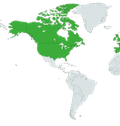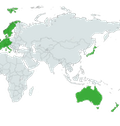this post was submitted on 20 Feb 2024
71 points (100.0% liked)
chapotraphouse
13538 readers
822 users here now
Banned? DM Wmill to appeal.
No anti-nautilism posts. See: Eco-fascism Primer
Gossip posts go in c/gossip. Don't post low-hanging fruit here after it gets removed from c/gossip
founded 3 years ago
MODERATORS
you are viewing a single comment's thread
view the rest of the comments
view the rest of the comments
If you're familiar with the neuroscience research on dementia, you've maybe heard people talk about "cognitive reserve." The basic puzzle is similar: we have a good understanding of what the organic basis of dementia is, but it turns out that two people can have similar levels of organic degradation--brain damage--but show markedly different levels of actual functional cognitive decline; one person might be barely self-sufficient, while the other shows almost no symptoms, and their brains look basically identical. Cognitive reserve helps explain this: if you're educated, otherwise healthy, used to thinking critically and reasoning out problems and so on, you can absorb more organic damage without loss of functionality.
In climate policy discussions, we talk about something similar called "adaptive capacity." This has a ton of overlap with wealth, but even more so with the kinds of material conditions that Marx talked about just through the lens of climate change. Adaptive capacity is, as you might expect, the set of material conditions that make it possible for a country (or city or region or continent or whatever) to absorb climate change without people starving, or supply chains breaking down, or other harmful impacts becoming super significant: it's a kind of socio-economic cognitive reserve. If your economy is primarily agrarian, has a weak social safety net, is relatively poor, is mostly coastal (or already quite warm) or otherwise already eeking out an already marginal existence, even a small climatological shock has the potential to wildly destabilize things to the extent that it's impossible to recover from.
On a household level, this looks like the poverty trap. Consider two households: one is barely scraping by, and the other makes $250,000 per year. When they're both subjected to an economic shock, what happens? Both see their incomes and resources depleted, but the rich household has enough assets that they can absorb the shock wait for a recovery, and come out the other side fine. The poor household doesn't have this luxury. If the shock is something like (say) a medical emergency, maybe the household has to sell their only car to help pay for the ambulance ride. Without a car, they have trouble getting to work, so eventually they lose their jobs, causing them to get evicted, making it harder to get a new job, etc. We're all familiar with this kind of material death spiral.
Adaptive capacity is like that on a national level, and that's why the global south is going to get hit harder by climate change, at least at first. Of course, the negative repercussions aren't going to be confined there--no matter how much cognitive reserve you have, enough damage will eventually result in dementia. Moreover, things like refugee crises caused by the rolling catastrophe sweeping across the global south will eventually hit the
 . It's eventually going to be bad for all of us but, like most things, it's going to be worse (and hit sooner) for the people who have already had their resources systematically plundered in order to give the United States more adaptive capacity.
. It's eventually going to be bad for all of us but, like most things, it's going to be worse (and hit sooner) for the people who have already had their resources systematically plundered in order to give the United States more adaptive capacity.
Thank you for the explanation